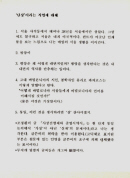HWANG Se-jun, in his "fragments of thinking" talks about the alienation and anonymity of megalopolitan life: "Seoul is foreign to me. My each day in the city is spent with a sense of something like looking at a misprinted matter..." Lively and convenient though megalopolitan life may be, more people are feeling alienated and indisposed in them. The city has a myth, that of modernism and developmentalism. And the "liveliness" of the city, a dead place deprived of the soil, can hardly be considered as vitality in its true sense of the meaning. "What is it that makes Pyongyang so personal? To think about Pyongyang is to reflect upon a history of one's own inner self." We see ourselves in Pyongyang, the city which is governed by the modernist who with his great power wishes to introduce Saemaeul Movement into his own nation. Calendars with nothing but numbers; calendars with a picture of Chunji of Mt. Baekdu(san) and the notes and lyrics of national anthem printed on them; the offset printings of our beautiful land painted in bright colors and that beauty staled like a stuffed specimen, having been blotted out by a marker pen. The "entry record" next to them, is full of jocular cynicism. The printed matter plastered on the floor bears the contradictions of the "law-abiding covenant" without escaping. The passage cited from Jo, Joungwhan is magnified and hung on the wall. (...) The author wants to speak about the falsehood, on the myths of nationalism, modernism, developmentalism, fetishism and
metropolitanization, those concepts which must be examined at this outset of the century ― that they are but "out of focus".
<From the article of CHOI Hyo-jun, the planner of this exhibition.>
 fragments of thinking |
 fragments of thinking |
 fragments of thinking |